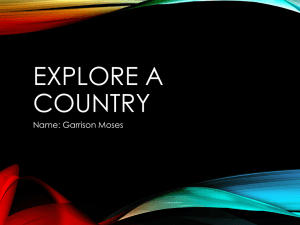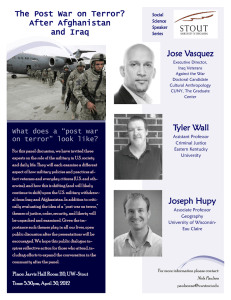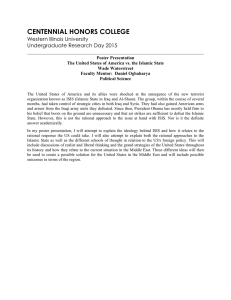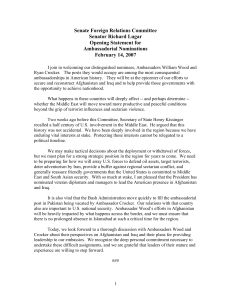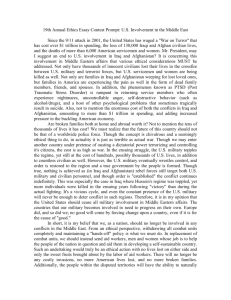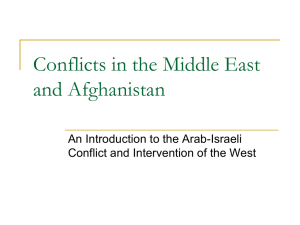Teaching About 9/11
advertisement
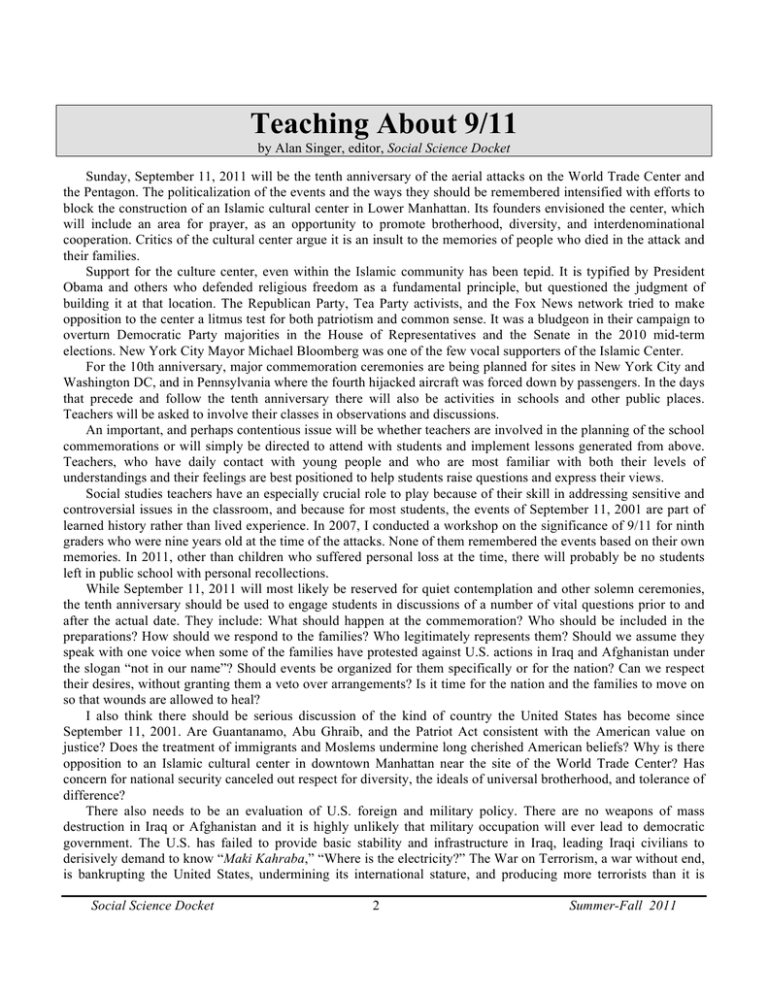
Teaching About 9/11 by Alan Singer, editor, Social Science Docket Sunday, September 11, 2011 will be the tenth anniversary of the aerial attacks on the World Trade Center and the Pentagon. The politicalization of the events and the ways they should be remembered intensified with efforts to block the construction of an Islamic cultural center in Lower Manhattan. Its founders envisioned the center, which will include an area for prayer, as an opportunity to promote brotherhood, diversity, and interdenominational cooperation. Critics of the cultural center argue it is an insult to the memories of people who died in the attack and their families. Support for the culture center, even within the Islamic community has been tepid. It is typified by President Obama and others who defended religious freedom as a fundamental principle, but questioned the judgment of building it at that location. The Republican Party, Tea Party activists, and the Fox News network tried to make opposition to the center a litmus test for both patriotism and common sense. It was a bludgeon in their campaign to overturn Democratic Party majorities in the House of Representatives and the Senate in the 2010 mid-term elections. New York City Mayor Michael Bloomberg was one of the few vocal supporters of the Islamic Center. For the 10th anniversary, major commemoration ceremonies are being planned for sites in New York City and Washington DC, and in Pennsylvania where the fourth hijacked aircraft was forced down by passengers. In the days that precede and follow the tenth anniversary there will also be activities in schools and other public places. Teachers will be asked to involve their classes in observations and discussions. An important, and perhaps contentious issue will be whether teachers are involved in the planning of the school commemorations or will simply be directed to attend with students and implement lessons generated from above. Teachers, who have daily contact with young people and who are most familiar with both their levels of understandings and their feelings are best positioned to help students raise questions and express their views. Social studies teachers have an especially crucial role to play because of their skill in addressing sensitive and controversial issues in the classroom, and because for most students, the events of September 11, 2001 are part of learned history rather than lived experience. In 2007, I conducted a workshop on the significance of 9/11 for ninth graders who were nine years old at the time of the attacks. None of them remembered the events based on their own memories. In 2011, other than children who suffered personal loss at the time, there will probably be no students left in public school with personal recollections. While September 11, 2011 will most likely be reserved for quiet contemplation and other solemn ceremonies, the tenth anniversary should be used to engage students in discussions of a number of vital questions prior to and after the actual date. They include: What should happen at the commemoration? Who should be included in the preparations? How should we respond to the families? Who legitimately represents them? Should we assume they speak with one voice when some of the families have protested against U.S. actions in Iraq and Afghanistan under the slogan “not in our name”? Should events be organized for them specifically or for the nation? Can we respect their desires, without granting them a veto over arrangements? Is it time for the nation and the families to move on so that wounds are allowed to heal? I also think there should be serious discussion of the kind of country the United States has become since September 11, 2001. Are Guantanamo, Abu Ghraib, and the Patriot Act consistent with the American value on justice? Does the treatment of immigrants and Moslems undermine long cherished American beliefs? Why is there opposition to an Islamic cultural center in downtown Manhattan near the site of the World Trade Center? Has concern for national security canceled out respect for diversity, the ideals of universal brotherhood, and tolerance of difference? There also needs to be an evaluation of U.S. foreign and military policy. There are no weapons of mass destruction in Iraq or Afghanistan and it is highly unlikely that military occupation will ever lead to democratic government. The U.S. has failed to provide basic stability and infrastructure in Iraq, leading Iraqi civilians to derisively demand to know “Maki Kahraba,” “Where is the electricity?” The War on Terrorism, a war without end, is bankrupting the United States, undermining its international stature, and producing more terrorists than it is Social Science Docket 2 Summer-Fall 2011 eliminating. The U.S. and the international community must decide what actually constitutes terrorism and stop acting reflexively. Activities organized around the tenth anniversary of the 9/11 attacks should provide an opportunity to engage students in an evaluation of U.S. policies that may have contributed to the attacks and may make the U.S. vulnerable again. Few high school students are ever exposed to critical analyses of United States foreign policy, which leaves them completely unable to evaluate the standard narrative presented in school and the media that somehow the United States is different from other nations, a shining democratic “city on the hill” for others to emulate and the defender of freedom around the world. Chalmers Johnson, author of Dismantling the Empire: America’s Last Best Hope (NY: Metropolitan Books, 2010), disagrees with this formulation. He sees the United States as a disruptive force in world affairs and is especially concerned that it cannot long survive as both a domestic democracy and a foreign imperialist power (28). Rather than exporting democracy, he believes the U.S. is exporting dictatorship and ruin. He views democratic movements in Japan, South Korea, and Latin America in the era after World War II as reactions against U.S. intervention rather than as movements nurtured by U.S. actions and beliefs. Johnson is far from being a radical, which makes it difficult to dismiss his arguments. He was an expert on East Asian affairs and a professor at the University of California, San Diego until he died in 2010. From 1968 until 1972, Johnson was a consultant for the U.S. Central Intelligence Agency Office of National Estimates. Johnson’s books and articles initially focused on China and Japan, but starting in the late 1990s he analyzed and commented on U.S. military and foreign policy. One of his goals was to explain why so many other countries seemed to hate the United States. He argued that in many cases the hatred was justified. Johnson also took the very unpopular stance of explaining the attacks of 9/11 as “blowback,” a CIA term that he uses to refer to unanticipated consequences of U.S. imperialist policies in the Islamic world. Johnson dates the underlying causes of the 9/11 attacks on the United States to a decision by President Jimmy Carter and his national security advisor Zbigniew Brzezinski in July 1979 to provide secret aid to insurgents opposing the pro-Soviet government of Afghanistan. This decision triggered a Soviet invasion and led to an expanded civil war, the emergence of U.S. financed and armed Islamic fundamentalist military forces, including thousands of soldiers under the command of Osama Bin Laden, and Taliban control over Afghanistan. In addition to U.S. aid, the Islamic fighters received as much as $25 million a month from Saudi Arabia and military training from the Pakistani army, two countries that were supposedly coordinating their activities with the United States. The money provided by the U.S. and its allies helped Bin Laden build his military base of operations in Khost, Afghanistan. Johnson argues that U.S. intervention in the Islamic world is just one example of its post-World War II imperialist policies. Since 1953, the United States CIA and military have overthrown, attempted to overthrow, or interfered with legitimate governments in Iran, Guatemala, Cuba, Congo, Brazil, Indonesia, Haiti, the Dominican Republic, Vietnam, Laos, Cambodia, Greece, Chile, Afghanistan, Grenada, El Salvador, Nicaragua, and Iraq. The Federation of American Scientists documents that between the end of World War II and 2001, the United States military and covert spy agencies were involved in over two hundred military operations, none of which produced democratic governments. To enforce its will, the currently United States maintains over 850 overseas military bases with 200,000 troops in more than 40 countries (not including Iraq and Afghanistan) around the world. This is a very different picture of the United States and of 9/11. Whether you agree or disagree with this interpretation of events, it is an interpretation that students have a right to hear, analyze, and reject if they find it inadequate or misguided. They certainly should be exposed to it before they are asked to enlist in the military to fight in Iraq or Afghanistan and before they are asked to vote for candidates who support continued war policies. I am especially concerned, and I think everyone should be concerned, about whether oppositional ideas will be expressed during the 10th anniversary celebrations. People fear being targeted because of their beliefs and we may be entering another era like the 1950s when McCarthyism and red-baiting equated a belief in human decency with treason. I believe the official response to WikiLeaks, including holding its chief officer on unsubstantiated charges of sexual misconduct and threats to try him as a spy or for treason, was designed to silence future dissidents and whistle-blowers, not just to punish him. Social Science Docket 3 Summer-Fall 2011
